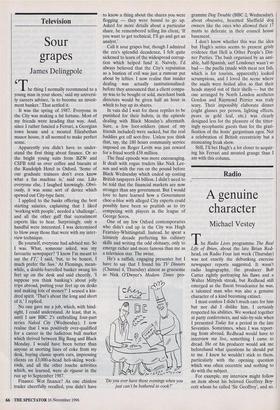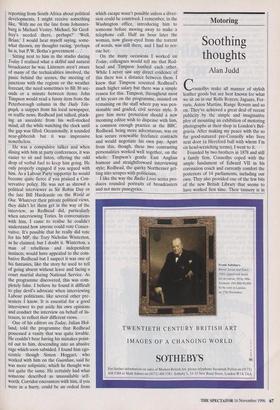Radio
A genuine character
Michael Vestey
The Radio Lives programme The Real Life of Brian, about the late Brian Red- head, on Radio Four last week (Thursday) was not exactly the debunking exercise newspaper reports suggested. It wasn't radio hagiography, the producer Bob Carter rightly portraying his flaws and a Walter Mittyish streak, but Redhead still emerged as the fluent broadcaster he was, a talented man who was also a genuine character of a kind becoming extinct.
I must confess I didn't much care for him but nor did I dislike him. I certainly respected his abilities. We worked together at party conferences, and side-by-side when I presented Today for a period in the late Seventies. Sometimes, when I was report- ing from abroad, Redhead would have to interview me live, something I came to dread. He or his producer would ask me beforehand what questions he should put to me. 1 knew he wouldn't stick to them, particularly with the opening question which was often eccentric and nothing to do with the subject.
For example, my interview might follow an item about his beloved Geoffrey Boy- cott whom he called 'Sir Geoffrey', and so, reporting from South Africa about political developments, I might receive something like, 'With me on the line from Johannes- burg is Michael Vestey. Michael, Sir Geof- frey's needed there, perhaps?"Well, Brian,' I would hear myself saying, some- what thrown, my thoughts racing, 'perhaps he is, but P.W. Botha's government . .
Sitting next to him in the studio during Today I realised what a skilful and natural broadcaster he was. Listeners aren't aware of many of the technicalities involved, the panic behind the scenes, the meeting of junctions with the regions or the weather forecast, the need sometimes to fill 30 sec- onds or a minute between items. John Timpson would read a funny item from the Peterborough column in the Daily Tele- graph, a snippet from his local newspaper, or traffic news. Redhead just talked, pluck- ing an anecdote from his well-stocked mind, all the while watching the clock until the gap was filled. Occasionally, it sounded near-gibberish but it was impressive nonetheless.
He was a compulsive talker and when dining with him at party conferences, it was easier to sit and listen, offering the odd drop of verbal fuel to keep him going. He only properly engaged if you argued with him. As a Labour Party supporter he would become quite fierce if you praised a Con- servative policy. He was not as shrewd a political interviewer as Sir Robin Day or the late Bill Hardcastle on the World at One. Whatever their private political views, they didn't let them get in the way of the interview, as Redhead did, particularly when interviewing Tories. In conversations with him, I came to realise he couldn't understand how anyone could vote Conser- vative. It's possible that he really did vote for his MP, the Tory Nicholas Winterton, as he claimed, but I doubt it. Winterton, a man of rebellious and independent instincts, would have appealed to the com- bative Redhead but I suspect it was one of his fantasies, like the story he used to tell of going absent without leave and facing a court martial during National Service. As the programme discovered, this was com- pletely false. I believe he found it difficult to play devil's advocate when interviewing Labour politicians, like several other pre- senters I know. It is essential for a good interviewer to put aside his own opinions and conduct the interview on behalf of lis- teners, to reflect their different views.
One of his editors on Today, Julian Hol- land, told the programme that Redhead possessed a vanity that was quite lovable. He couldn't bear having his mistakes point- ed out to him, descending into an abusive rage which soon subsided. I found him ego- centric though Simon Hoggart, who worked with him on the Guardian, said he was more solipsistic, which he thought was not quite the same. He certainly had what someone described as unassailable self- worth. Corridor encounters with him, if you were in a hurry, could be an ordeal from which escape wasn't possible unless a diver- sion could be contrived. I remember, in the Washington office, introducing him to someone before moving away to make a telephone call. Half an hour later the woman, now glassy-eyed from the torrent of words, was still there, and I had to res- cue her.
On the many occasions I worked on Today, colleagues would tell me that Red- head and Timpson loathed each other. While I never saw any direct evidence of this there was a distance between them. I knew that Timpson resented Redhead's much higher salary but there was a simple reason for this. Timpson, throughout most of his years on the programme, insisted on remaining on the staff where pay was pen- sionable and graded, civil service style. It gave him more protection should a new incoming editor wish to dispense with him, a common enough practice at the BBC. Redhead, being more adventurous, was on less secure renewable freelance contracts and would negotiate his own pay. Apart from this, though, these two contrasting personalities worked well together, on the whole: Timpson's gentle East Anglian humour and straightforward interviewing style; Redhead, the quirky Northerner get- ting into scrapes with politicians.
I like the way the Radio Lives series pro- duces rounded portraits of broadcasters and not mere panegyrics.



















































































 Previous page
Previous page